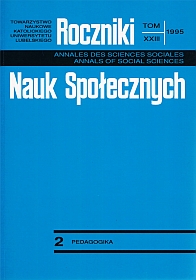Stanisław Jachowicz − bajkopisarz, pedagog i opiekun
Abstrakt
Custodial pedagogy is a young branch of knowledge, which was distinguished from social pedagogy in the interwar period. This branch has to meet some methodological difficulties but is grounded on a time-honoured practice of custodial and caring activity conducted by outstanding pedagogues.
One of the precursors of custodial pedagogy was Stanisław Jachowicz (1796-1857). Is activity bore a caring, formative and didactic character. He was a renown private tutor of the Polish language. He understood his tasks which was as follows: promoting morality by teaching, and the foundation of morality was faith and God-fearing.
Stanisław Jachowicz became one of the most outstanding writers for children. He write ca 800 works, many of which were brought out in dozens of editions, and some have cherished popularity up to this day. With his writing he sought to form young generation of Poles in the spirit of the love of God, homeland and the neighbour.
He is the first to have created fable at the service of pedagogy directed to children, a fable which teaches, forms and educates. It was also his innovatory venture to apply songs as a formative method. He contributed immensely to the development of periodical press; he edited his own periodical "Dziennik dla Dzieci" (Daily for Children). The paper entailed a lot of information on science, politics, culture, everyday life and entertainment; all this was written in a manner comprehensible for young readers.
Stanisław Jachowicz was an indefatigable and deeply committed custodian. He organized the Institute for Morally Forsaken Children in which he took care about children morally degraded and orphans. He ensured them a living, custody, and established "a little school for orphans" in which children learned elementary things and gained some profession supervised by experienced craftsmen.
Stanisław Jachowicz was well aware of the significance of pedagogical measures taken by the Institute; he cared about financial security of his undertakings. He manifested an extraordinary, or even surprising, ingenuity in thinking up various forms of stimulating society to generosity or taking advantage of human curiosity.
He belong to the group initiating the Care for Little Children, a centre patterned according to the most progressive formative ideas of Swoboda and Frobel. Day-nurseries provided care for the children whose parents worked, formed their minds and hearts through play.
The life of Stanisław Jachowicz was marked with special activity in many divisions of social life. He was an outstanding pedagogue, great fable writer and committed philanthropist. While serving Polish society, he sought ever new, better forms of aid and new ways of formative influence adjusted to the political, economical, and social conditions.
Bibliografia
Kaniowska - Lewańska I.: Stanisław Jachowicz. Życie, twórczość i działalność. Warszawa 1986.
Korwin B.: W setną rocznicę urodzin Stanisława Jachowicza. „Wędrowiec” 1896 nr14 s.265-266.
Kraków P.: Obrazki i obrazy Warszawy. Warszawa 1848.
Łagowski F.: Spuścizna literacko-pedagogiczna po Stanisławie Jachowiczu. Warszawa 1891.
Matuszewski I.: Stanisław Jachowicz. „Gazeta Polska” 1896 nr 89-90 s. 3-7.
Muszkowski J.: Geniusz serca. Z powodu 75-letniej rocznicy śmierci Stanisława Jachowicza. „Ruch Pedagogiczny” 1933 nr 3 s. 97-103.
Pierwsze danie sprawy o Instytucie Moralnie Zaniedbanych Dzieci. Rok 1835. Warszawa 1835.
Schnur - Popławski L.: Stanisław Jachowicz. Wspomnienie w setną rocznicę urodzin. „Gazeta Lwowska” 1896 nr 86 s. 4-10.
Skimborowicz H.: Stanisław Jachowicz. „Gazeta Warszawska” 1858 nr 29 s.4-6.
Wieniec, pismo zbiorowe ofiarowane Stanisławowi Jachowiczowi przez pierwszych kraju autorów oraz licznych innych Jego przyjaciół i wielbicieli. T. 1-3. Warszawa 1857-1858.
Zdanie sprawy z działań WTD za rok 1855. Warszawa 1856.
Copyright (c) 1995 Roczniki Nauk Społecznych

Utwór dostępny jest na licencji Creative Commons Uznanie autorstwa – Użycie niekomercyjne – Bez utworów zależnych 4.0 Międzynarodowe.


